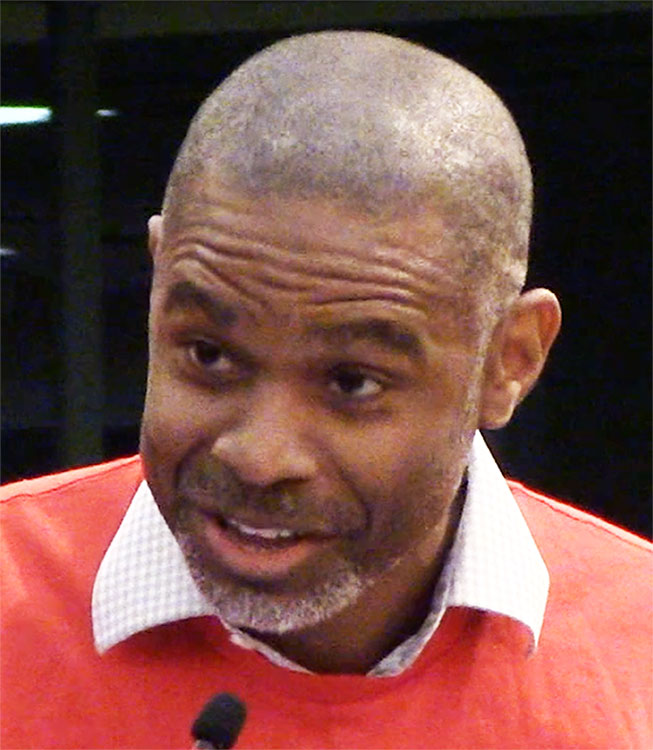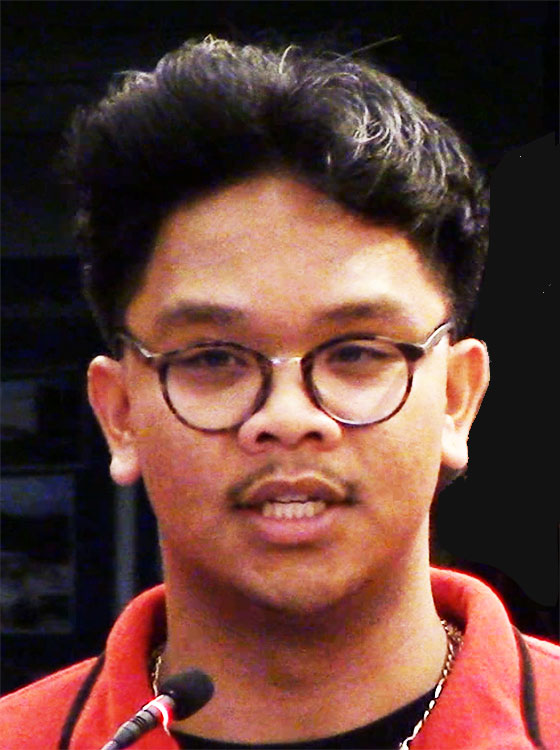March-April 2020 Advocate: Faculty and students explain to Trustees why faculty deserve a fair contract
CAMPAIGN FOR A FAIR CONTRACT
Faculty and students address Board of Trustees to explain why faculty deserve a fair contract
Over 80 faculty and student supporters packed the February 26 Board of Trustees meeting to hear passionate speakers explain to the Trustees why we need a fair contract that addresses excessive faculty workload and provides pay parity to part-time instructors. Kolo Wamba, Skyline College part-time physics instructor, spoke about how climate change relates to excessive workload for faculty and part-time equity. You can read Kolo’s speech below or watch it online here. EJ Unisa, Skyline College student, spoke about the impact of faculty’s excessive workload on students. You can read EJ’s speech below or watch it online here.
Connecting climate change to excessive faculty workload and part-timer pay parity

My name is Kolo Wamba and I teach physics part time at Skyline.
I came to the Community College system having spent a little over a decade as a California tech worker, using my knowledge of physics to help millionaires become billionaires. I was an unwitting cog in the carbon industrial complex. I’d been doing this for about 4 years when the Deep Horizon disaster happened, and I started to become intensely aware of the dangers of fossil fuels. Then I started to learn more about climate change, which gradually turned into an obsession. Like most technologists, I initially assumed that climate change was merely an engineering problem. If only the right group of the right technologists could invent and deploy the right carbon capture systems and green up our infrastructure, everything would turn out fine, right?
Plus, it would mean that people like me, who were technologically inclined (but not environmental engineering experts), could make a real contribution by helping to provide a solid STEM education to the generation of tech folks who actually become those experts and get it done. At least, that was where my head was at back in 2012, so I took a part time job teaching math at DeVry University, which at the time was only place that would take me without any prior teaching experience. I taught at DeVry off and on for the next 4 years while continuing to work in industry. Finally in 2016, I followed my spouse, who was relocating for a job, back to the Bay Area, and found a part time physics teaching gig at Gavilan for myself.
Trying to make it in the Bay Area after having been gone for almost a decade was a rude reminder that when you find yourself spending all your free time sitting in traffic and most of your money on housing and gas, something is seriously off. I started to notice a strong correlation between how much the Bay Area economy grew and the number of tents I would see pitched under overpasses around where I live. And it became clear to me that this was all deeply connected to the rate at which carbon is being added to the atmosphere. You see, about half of carbon emissions come from the top 10% of income earners. These are the folks who zip about in carbon-vomiting jets and have multiple homes, and many of these people are our very own Silicon Valley tech folks. That’s when it hit home: the carbon industrial complex is the inequality industrial complex, and the fight to stop and reverse climate change is really the fight to stop inequality in all its forms.
It is the fight for gender justice, and racial justice, and disabled rights, and LGBTQ rights, and indigenous rights, and immigrant rights, and, yes, labor rights. For me this came to a head last year, which is when I resolved to actually do something about it. You could say that this was when I became radicalized, although I hate that word– to me the radical idea is that it’s normal and acceptable for homelessness to skyrocket whenever the local economy heats up. By that time I was working a full-time engineering job at a Silicon Valley tech company and teaching one or two physics labs at Skyline on the side. But I also realized that I could actually fight back. I could withhold my labor from the inequality industrial complex, and instead apply it to a fully unionized, low-carbon industry, which is what community college teaching is.
And so, last fall, I became a full-time adjunct and I took on a full teaching load (between Skyline and Gavilan College), and I changed my industry job from full-time to part-time (to help pay the bills). I am so glad I made this decision– next to marrying my wife, it ranks as one of the best I ever made. I love teaching, and I’m almost good at it. Physics is a fun subject, and I have great colleagues, but above all it’s really about the students. I love working with students– after all, they are ultimately why we are all here.
Still, as I’ve said, the fight to stop climate change is a fight against inequality, and we can start by fighting right here in our own district! Part-time faculty still, at best, earn only about 70% of what full-timers get on an hourly basis. And we don’t get the same health plan– ours isn’t even a plan– it’s partial insurance reimbursement, and many of us don’t even qualify for it because we teach too few units. This is not acceptable. This is about equal pay for equal work, and there’s absolutely no doubt that we do equal work. We teach the same classes and labs, hold the same office hours, and some of us even do the same committee work. What’s more we are routinely called upon to cover classes and labs for full-timers when they are away. We are of course more than happy to do it– after all, it means more time with the students about whom we care so deeply, and the full-timers are always more than willing to do the same for us.
Fortunately, AFT has a proposal for pay equity and workload compensation that addresses these issues, I fully support it. Not only would it provide parity, it would ensure that full-timers do not get overworked and that part-timers do not end up performing uncompensated tasks. But ultimately this is about more than compensation– it is really about social justice! If you haven’t noticed, my cohort of part-time faculty are more ethnically diverse and, at least in my program, are overwhelmingly female. It is clear, therefore, that the lack of pay parity is an obvious contributor to the gender pay gap. Whether this is intentional or not is immaterial. Does the district really want to be seen as a place where gender discrimination is just part of the scenery? Potentially even worse, does the district want to be on the side of history that stood in the way of progress against inequality? Against climate change?
This type of thing is exactly what I came here to get away from when I drastically reduced my involvement in Silicon Valley tech. To those folks, inequality is fine because they continue to harbor the delusion that we live in a meritocracy. Don’t be like them– they are the ones who are making things worse for everyone.
You have the means, motive and opportunity to take a baby step towards the right side of history, and I urge the board to take this matter very seriously. I haven’t been in the district all that long, and even I can see that it is long overdue.
How students are impacted by faculty’s excessive workload
 Good evening Board Members, members of the community, and all who are present. My name is EJ Unisa. I am a student, Campus Ambassador for Outreach at Skyline College, and a future educator. I am here in solidarity with the American Federation of Teachers, Local 1493 and students of SMCCD.
Good evening Board Members, members of the community, and all who are present. My name is EJ Unisa. I am a student, Campus Ambassador for Outreach at Skyline College, and a future educator. I am here in solidarity with the American Federation of Teachers, Local 1493 and students of SMCCD.
As a first-generation student, I am deeply grateful for the many educational opportunities that Skyline has provided for me. Programs such as the Promise program, Kababayan and CIPHER Hip Hop Learning Communities, Forensics Speech and Debate Team, and even with employment under the Outreach Department have all served to enhance my growth as a student and global citizen. I hope you believe me when I say that from the bottom of my heart, that I am grateful to Skyline and the San Mateo County Community College District.
Now it is said not to bite the hand that feeds you, but I think we can all agree that we have been fed lies about our educational system. With SMCCD as a student-centric institution, how can I feel confident in my own success and for the success of my peers and community knowing that my professors and counselors are fighting for fair treatment?
Like many of my underserved peers, the ability to navigate through college all starts with the relationship you build with your professors and with your counselors. And I have personally experienced great care and inspiration from both at Skyline. But if they themselves do not have the capacity, energy, nor time to help students because of their excessive workload, because of their fatigue, it fosters an environment in which students are being set up for failure rather than success; thus creating a rippling effect, affecting not only the student as an individual, but our schools as an institution, and the community as a whole.
As students— first-generation, international, adult— we are all trying to swim and stay afloat the harsh sea that is higher education. If our lifeline: our professors and counselors, are too, trying to stay afloat, then we are all going to drown.
As an Outreach Ambassador, I want to promote our colleges in a way that highlights them for all their greatness, but it is hard to do when there is the reality of injustice perpetrated on our own faculty, and in return, its students. I want folks to be able to become empowered and transformed into a global community of learners. I want to help foster success and ensure equitable opportunities for all our students, while celebrating the diversity of our campus. I want to help cultivate in our students the ability to think critically and creatively, communicate effectively, reason quantitatively, and understand and appreciate different points of view within a diverse community. I want students to attend the San Mateo County Community College district and be supported all the way through.
And as a future educator myself, my educational philosophy is that education is a lifelong journey of growth and introspection. Education does not simply stop when you stop attending school. And I know that if you settle this contract with faculty fairly, it will set a grand precedent for the future of education itself.
Now, I believe in your ability, as a governing body, and I believe in our ability as a community, that we can all help foster an environment that is not afraid to admit its own faults and imperfections, but one that accepts it, and will actively grow from it: that we will be better than the past that was written for us, because now we, together, will write our future. Now we must not work against each other, for this fight is not just for our faculty, and it’s not just for our students, it is for our community and for all the students who will continue to come through the doors of our colleges.
Thank you.
